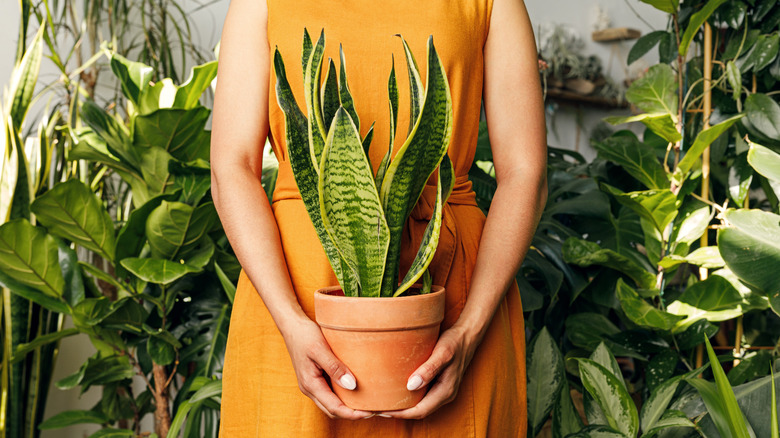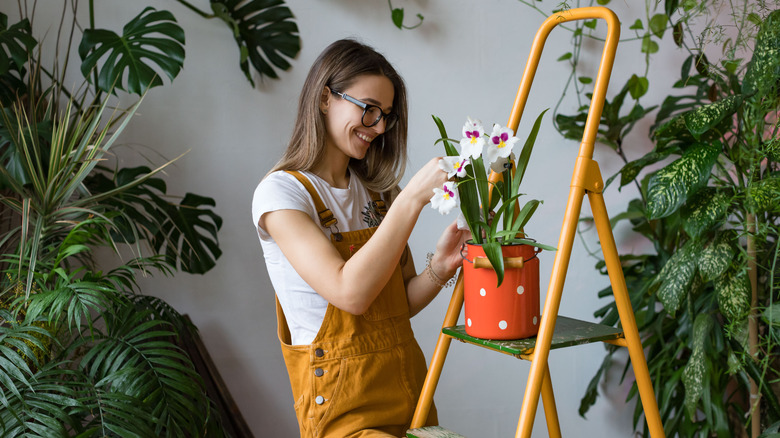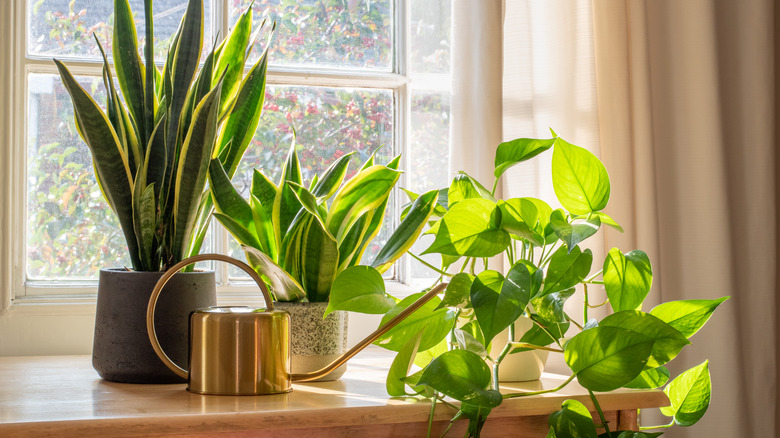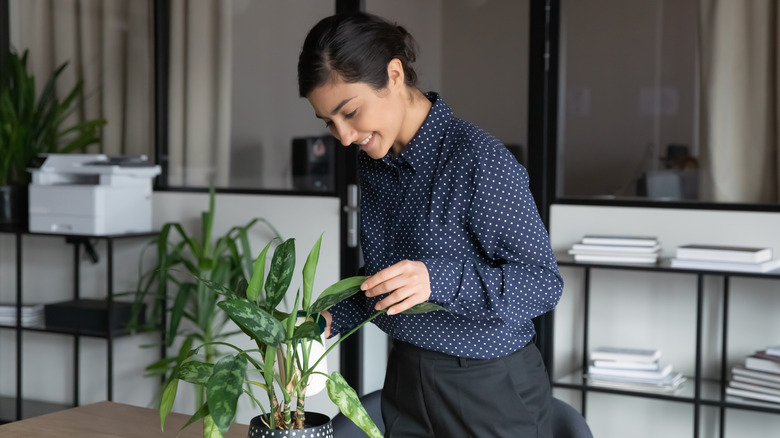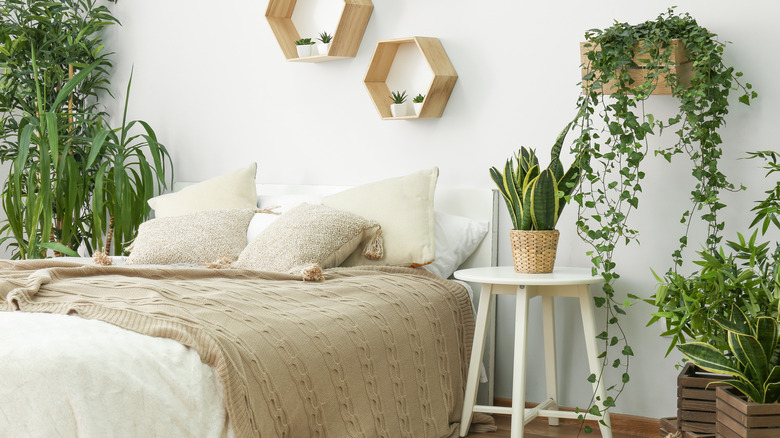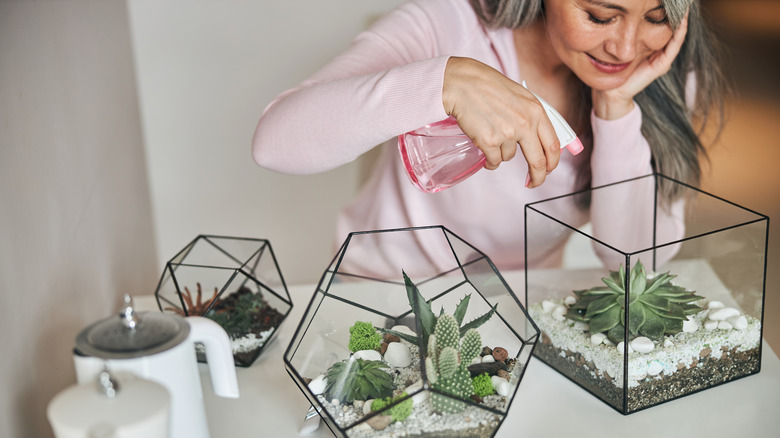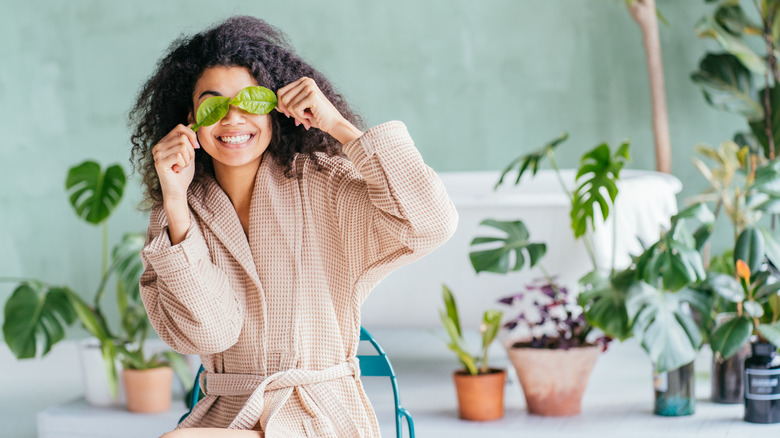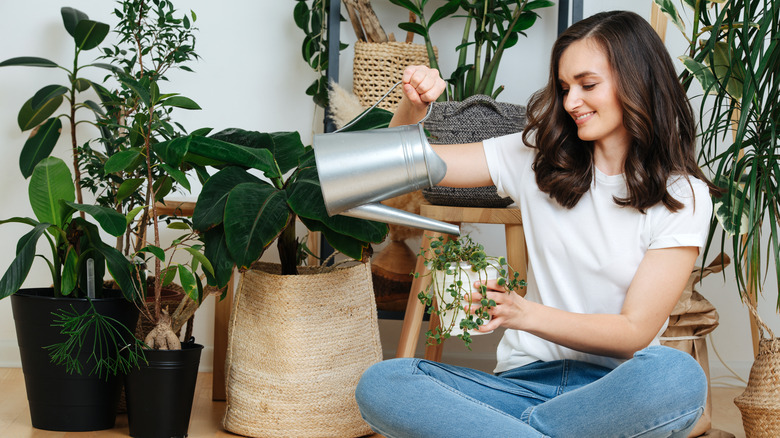Why Having Plants Indoors Is Good For Your Health
If you're considering adding a leafy companion to your home this season, you should go for it. You'll see a number of benefits to your health after bringing plants into your indoor spaces. Besides, you'll never know if you have a green thumb if you never try taking care of a plant.
Biophilic design is centered around our need to connect with nature within modern environments, according to Metropolis. Their article also points out that we spend roughly an average of 90% of our time indoors. Changing your indoor scenery by incorporating plants can have a positive effect on your overall health and happiness. Prevention points out that indoor plants also liven up a room, making it more comfortable. For those who choose to greenify their surroundings, the benefits are manifold.
Few ways of improving your life are as easy as buying and caring for a plant. Read on to find out how having plants indoors can help with things ranging from improving your concentration to potentially providing allergy relief and better air quality indoors. It may surprise you that something so simple could have so many positive effects.
Being surrounded by plants can help reduce stress
The American Heart Association states that daily stress and trauma can increase the risk of heart disease. Keeping stress levels down can therefore help you avoid serious health complications, such as a heart attack. This is one area where plants can provide assistance. Horticulturist Marc Hachadourian told Insider, "There are obviously therapeutic effects of caring for plants and gardening has been shown to decrease blood pressure and reduce stress." If indoor plants can help to lower blood pressure, a key indicator of the stress hormone cortisol, they may end up saving your life.
Keeping your heart healthy is one of many ways that lowering stress is a boon to health. It's also worth noting that being less stressed not only lowers mortality rates (via NPR) but may help you to have better relationships with others, according to Nevada Today, which can itself create a positive feedback loop. Thrive Global has said that when your relationships are stronger, that will also increase happiness and lead to a better overall mood. All thanks to the magical effect of having plants around your home.
Indoor plants purify the air in your home
An article from Fast Company notes that as home insulation has improved over the years, efficient air circulation has declined. Now, biofilters are being engineered to harness the power of plants to remove particulate matter and pollution. Plants are able to filter many kinds of pollutants out of the air in your home, including chemicals and smoke, according to a study by NASA. This natural filtering process can have positive side effects for your health, such as reducing frequency of headaches from poor air quality. Having plants around will also help with allergy relief by keeping your air clean and clear.
This secret power of plants has actually been known for some time by researchers at NASA, who have been studying eco-solutions for decades. Though the exact amount and type of plants needed to achieve a significant improvement in air quality may vary, you can be confident that more plants are better for the air around you.
Plants can surround you with positive energy
Positive energy is a "buzz word" in psychology, and it generally refers to positive attributes, such as agreeableness and optimism, according to Psychology Today. Being around plants helps to boost these feelings, so that you can take on the world with a better attitude. Home Depot even offers a positive energy gardening guide with tips you can incorporate for natural indoor design as well.
Ultimately, surrounding yourself with plants indoors will boost your well-being by changing the energy in your home for the better. Gathering information from multiple studies, Texas A&M University noted that positive energy is derived from an environment that includes the presence of flowers and that this "makes you feel more relaxed, secure, and happy." It's worth trying out to see whether you notice a change in yourself after sprucing up your environment with flowers or a plant or two.
Tending to plants increases mindfulness
The small acts of care you provide for your plant can also double as acts of meditation, or mindfulness, according to Thrive Global. Slowing down to be in the moment with your plants is a way of reclaiming your time and living mindfully. An engineer and business owner named Mike Robinson gave a TED talk in which he discussed buying plants for all of his employees. He found that because each employee had to choose their own plant, they gained a personal connection with their plants which increased their satisfaction at work. Robinson was at first alarmed to notice his employees spending a few minutes each day caring for and admiring their plants, thinking that this might hurt the company's bottom line, but found that his business was only becoming more profitable, not less.
The moral of the story is that going through the motions of plant care can actually instill a sense of calm and well-being in people. This makes it a worthwhile practice that is good for you overall.
Plants can help boost your productivity
If improved concentration is something you've been needing, you'll be pleased to know that having plants around you can give your productivity a boost. As Mike Robinson found out, employees can actually improve their work output as a result of simply sharing desk space with a plant. In fact, huge retailers are already well aware of this and working to take advantage of it. In 2018, Amazon unveiled a series of giant domes filled with more than 40,000 plants for its employees to use as workspace. The Washington Post said this space was intended to be a "workplace tool that could help the retail giant attract, retain and enhance the productivity and well-being of its fast-growing workforce."
The productivity boost seems to come down to the restorative effect plants have on us. Fast Company reports that this can lead to functional improvements in memory, attention, and other elements critical to working effectively. It might be time to request a stipend from your boss to purchase some plants.
Plants help to regulate the temperature
One thing some plants do well is boost humidity, which can be great for your skin and respiratory health, according to one dermatological study. Through transpiration, plants release water into the surrounding air, as explained by Trees.com. Having this moist air around you can keep you feeling refreshed and even help to prevent certain illnesses, since the flu virus prefers low-humidity environments, according to Consumer Reports. Those plants with high-transpiration rates, like the Chinese evergreen plant, work especially well as natural humidifiers while clearing toxins from the air, reports House Beautiful.
They can also cool your home in the summer months, because as plants release water vapor to cool themselves, they also cool the surrounding environment. A professor of horticulture at the University of Vermont, Dr. Leonard Perry said that, according to the USDA, "proper use of plants could decrease air temperature in an office by as much as ten degrees." Rather than splurging on some fancy equipment to humidify or air condition your home, you could just look for certain plants that provide this service naturally. They seem happy enough to do it for free.
Being surrounded by plants may make you happier
For an easy way to boost your mood, spend some time around greenery. The University of Washington shared some heartening information about the effect of plants on happiness, saying that nature therapy can lead to "significant increases in well-being, social functioning and life outlook." Internally, you may not be aware of the impact that the presence or absence of plants is having on you, so it's a good idea to test it out and see if your well-being improves once you bring in a new plant or two.
An article from New York Mag offers great suggestions for choosing the best plant to own based on your personality and lifestyle. Whether you want something low-maintenance, colorful, or practical, there is a perfect plant for everyone. Picking the right one will ensure a symbiotic relationship that will result in both you and your plant being happy to have each other. As NBC News put it, your indoor garden "can be your refuge from the outside world," and having this sanctuary may bring a lot of joy to your life.
Some plants can help you sleep better
When choosing plants for your bedroom, it's important to pick ones that are equipped to help you sleep better. Treehugger recommends the aromatic plants lavender and gardenia, each of which releases a scent that is conducive to quality sleep. It doesn't hurt that they're nice to look at as well, and would make for a pleasant sight in the morning.
You should also consider orchids and succulents, the latter of which is one of the best indoor houseplants for beginners, as strong contenders for your bedside table space, as South Dakota State University points out that they release oxygen at night. Not all plants release oxygen all day and instead typically release carbon dioxide at night through the process of respiration. So you ought to make sure that the plants you choose for your bedroom are those that release oxygen at night, as noted by ProFlowers. This sort of plant will help you sleep and breathe easier, so you can wake up refreshed. Snake plants are one popular choice, according to Boston Magazine, though you might not want to think about their name too hard before you enter dreamland. As an added plus, they're one of the easiest houseplants to keep alive.
Plants can strengthen your immunity
A study from Wageningen University found that employees who worked around office plants called in sick less often. Whether plants are actually keeping people from getting sick as much or people are just more willing to work when plants are present, it's a positive sign either way. There is other evidence to support the idea that plants can give your immune system a boost, though.
EcoWatch suggests that one explanation for how plants help to strengthen immunity is that it results from other positive changes they bring on, such as getting better sleep and experiencing reduced stress. So, overlapping benefits end up creating new ones, as these changes add up to make you stronger overall in several ways. You can think of your total body health as encompassing many areas which impact one another, and plants appear to be able to touch quite a few of these. During flu season especially, having a stronger immune system is a valuable protection, and one that plants can help to provide.
Plants may help your mental health
Having a green space in your home gives you a sense of well-being that helps diminish mental health issues. Additionally, Psychology Today states that plants have been shown to lessen aggression, encourage people to get more exercise, and bring about other positive behaviors as well. Combining these findings with the knowledge that plants can reduce stress, it's no wonder that those who suffer from mental health issues can benefit from having plants in their homes. Some plants are also very resilient and may be perfect for people who are struggling to find the drive or energy to take on new responsibilities.
A story from the Canadian Broadcasting Corporation focused on a woman named Naomi Holmstrom and how gardening has worked as an effective treatment for her major depressive disorder, something her psychologist recommended. Holstrom said that caring for plants helps because you can "put your energy into that instead of into negative thought processes or negative thinking, or unleashing it somewhere else in other destructive ways." If tending plants can help to lessen depressive episodes and anxiety, why not give it a try?
Still, if you're experiencing mental health issues, it's always best to see a professional and follow a recommended treatment plan.
If you or someone you know is struggling with mental health, please contact the Crisis Text Line by texting HOME to 741741, call the National Alliance on Mental Illness helpline at 1-800-950-NAMI (6264), or visit the National Institute of Mental Health website.
Plants can give you privacy
Whether used to shield your space from prying eyes, or even to dampen the noise in a busy office, plants offer protection with just their presence. It's like having your very own big, green bodyguard. Plantscapers said that one practical function of indoor plants is their ability to lower background noise. Plants can combat outside sounds by absorbing it into their leaves, reflecting it back out, and even diffracting sound to break up its force. You may have seen walls of green lining a highway, and this is the same concept. The end result is plants giving you a more serene and quiet environment due to much of the noise being blocked before it gets to you.
Of course, some plants are large enough that they can provide some visual cover too. There are plants you can hang in windows and others which stand in planters surrounded by huge, green leaves. At home or in the office, these plants can give you some peace and privacy, in addition to a more pleasant working environment. Meyer Landscape even suggests that you might consider spiky plants to "ward off" unwelcome coworkers, though this might not get you team-player points from your boss.
You can be more creative with plants around
As if plants didn't already do enough to boost your brain health, now we know that they can help make you more creative. A study found that just viewing the color green can relax you and improve performance on creative tasks. "Even with a fake plant, your mind goes back to the Savannah," Leigh Stringer of design firm HOK told CNN. This is said to be a result of our instinctive bond with living systems, such as plant life. Essentially, we're wired to be in communion with nature and are at our best when we finally get back to that.
As for hard numbers, working alongside plants can boost creativity by 15%, according to PR Newswire. For a person working in the creative industry, this would be a huge jump. Imagine having more ideas in the course of a day or getting to an answer faster. If you're in the business of solving problems and generating ideas, you can't afford not to have some flora around.
Plants may speed up healing
Patients who engaged in horticulture therapy, which can involve patients taking care of plants, may see a number of benefits, according to University of Washington. This process appears to have therapeutic qualities, speeding up recovery and helping with pain management. Even fatigue was decreased in recovering surgical patients who had plants around them, according to a study publish in the Journal of Alternative and Complementary Medicine. This soothing quality time between people and plants is something we've all experienced at some point, and it may help to explain why hospitals frequently offer landscaped areas and gardens.
Psychology Today suggests that one way indoor plants aid with surgery recovery is that they tend to decrease anxiety. Again, this is an example of how one benefit connects with another to form a strong web of wellness. So, by all means, ask someone to water the plants if you ever need to go to the hospital. It may not seem like an urgent priority to most people, but the plants will return the favor when you're back and in need of some soothing.
Indoor plants will keep you company
For those who live on their own, having a plant around can provide companionship. Plus, there is a fulfilling sense of connection and responsibility for many who care for plants. Healthline writer Melissa Lee shared that caring for her plants gives her purpose, happiness, and makes her feel less alone. "I try to align my goals for both myself and my plants to be healthy and express consistent growth that comprises regular check-ins, hydration, nutrients, sunlight, and lots of love," Lee said. You could have that kind of connection with your plants too. It's a love that feeds the caregiver as well.
Horticulturist Charles Lewis told The Washington Post that providing care for plants involves "an incredible curative power." As we've seen, there seems no end to the ways that plants can change us and our lives for the better. Helping our physical health and our mental health, indoor plants are companions you'll be glad to have.
